English - Industrial Research Institute
English - Industrial Research Institute
English - Industrial Research Institute
You also want an ePaper? Increase the reach of your titles
YUMPU automatically turns print PDFs into web optimized ePapers that Google loves.
Ministry of Energy and Water<br />
The IRI works with the Ministry of Energy and Water<br />
in different areas, most importantly overseeing<br />
the manufacturing of gas bottles and certifying that<br />
they conform to the mandatory Lebanese standards.<br />
The IRI also inspects gasoline tanks in petrol stations,<br />
whether for licensing purposes or for maintenance<br />
when requested. In addition, the IRI inspects<br />
the nominal load of fuel tankers, in addition to other<br />
inspections that are conducted at the behest of the<br />
ministry.<br />
The IRI also conducts studies and offers technical<br />
consultation in national issues when requested, issues<br />
that fall under the scope of both the ministry’s work<br />
and the IRI’s fields of expertise.<br />
The Ministry of Environment<br />
The IRI continually cooperates with the requests of<br />
the Ministry of Environment, whether by analysing<br />
samples to assess their negative environmental impact,<br />
or whether by providing the Ministry of Environment<br />
with its services in the field of the inspection<br />
and auditing of factories, before suggesting the optimal<br />
approach in the production process in order to<br />
mitigate the latter’s negative environmental impact.<br />
The IRI also hosts the Lebanese Cleaner Production<br />
Centre (LCPC), which was established as a result of<br />
the cooperation among the Ministry of Industry, the<br />
Ministry of Environment, UNIDO and Austria.<br />
This centre’s main objectives include ensuring compliance<br />
with environmental standards during the different<br />
stages of production, something that is beneficial<br />
in terms of reducing costs by keeping waste<br />
in check on the one hand, and improving the environment<br />
by recycling wherever possible during the<br />
production process on the other hand.<br />
Ministry of Justice<br />
The judicial authorities continuously refer legal issues<br />
to the IRI for technical advice, as the IRI is the<br />
reference point for these authorities in what pertains<br />
to scientific issues.<br />
Customs<br />
Collaboration with the Lebanese customs is mainly<br />
done in the fields of enforcing and verification of<br />
conformity with the mandatory specifications required<br />
for goods imported to Lebanon, and which<br />
are subject to customs restrictions. This is done according<br />
to a specific and known mechanism.<br />
The Customs authorities, according to the customary<br />
procedure, can send samples to the IRI for analysis<br />
and for identification of their components, prior to<br />
clearing them for entry into the local markets.<br />
The Lebanese Standards Institution<br />
(LIBNOR)<br />
The IRI worked diligently to establish the Lebanese<br />
Standards Institution (LIBNOR), which is tasked<br />
with issuing the Lebanese standards. In the beginning,<br />
this institution was established in the campus<br />
of the IRI, which incubated its operations until it was<br />
reactivated in 1998. Since then, the IRI published<br />
approximately one thousand national standards for<br />
the institution, as per annual contracts that were in<br />
force from 1998 until 2004.<br />
The IRI is currently represented in the institution’s<br />
Board of Directors, while the IRI is permanently<br />
represented in the technical committees tasked with<br />
issuing and updating the national standards.<br />
The Lebanese Council for Accreditation<br />
(Colibac)<br />
Some time ago, the IRI realized that the infrastructure<br />
of a world-class quality process must include<br />
the following items:<br />
A national institution for the issuance of national<br />
standards, which in Lebanon is the Lebanese<br />
Standards Institution (LIBNOR), a body that is<br />
ever striving to improve its role.<br />
Bodies for conformity assessment that<br />
implement these specifications. This role is<br />
primarily assumed by the IRI in Lebanon, not<br />
only in the application of national standards, but<br />
also in the application of international standards<br />
in export operations as the IRI is internationally<br />
accredited according to Certificate No. 17025<br />
Oversight of the local market. This function is<br />
tasked to the Consumer Protection Directorate<br />
at the Ministry of Economy and Commerce<br />
A national council for accreditation, whose tasks<br />
include accrediting laboratories, monitoring<br />
commissions, conformity assessment for<br />
products and processes in the country. This<br />
national institution was not yet established in<br />
Lebanon, and the IRI sought hard to establish it<br />
in order to complete the quality infrastructure at<br />
the level of national institutions, until the decree<br />
of its establishment was issued in 2004, while<br />
the decree to establish its Board of Directors<br />
was issued in 2006. The IRI is represented in<br />
the Board of Directors of the Lebanese Council<br />
for Accreditation (Colibac).<br />
This council is still in the process of drafting its bylaws,<br />
which are nearing completion. Work is also<br />
underway to speed up the passing of the necessary<br />
legislations that will enable the council to start its<br />
operations and serve the purpose it was created for.<br />
92 93



